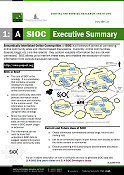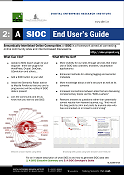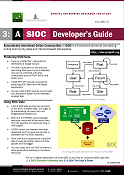General
State of the SIOC-o-sphere (#5)
2007, August 9 - 12:20 — CloudIt's that random time of the year again where I summarise what's been going on in the world of SIOC...
- We now have a SIOC W3C Member Submission! Along with W3C members Asemantics, DFKI, FZI, Fraunhofer, Fundación CTIC, OpenLink, Opera, STFC, UPM, University of Trento and other co-authors, Uldis and I edited three main documents as part of the submission describing the SIOC core ontology specification, SIOC applications and implementation status, and some ontologies and RDF vocabularies related to SIOC. You can also read the W3C Team Comment for our submission. Thanks again to everyone involved!
- The Semantically-Interlinked Scientific Communities project aims to improve how scientific data and knowledge is represented and communicated. It will use SIOC, FOAF, DC, Creative and Science Commons, OBO and HCLS ontologies and technologies as its basis.
- Mark Wahl has written a useful article entitled "organizing principles for identity systems: embedding SIOC in XHTML with RDFa" which details how to describe blog post structures using SIOC and RDFa.
- There is a Google Summer of Code project from the Apache Software Foundation on creating plugins for embedding/producing RDF/XML and microformats in Forrest content objects, and SIOC is one of the target vocabularies.
- John Wubbel has an interesting post about how SIOC and semantic technologies can connect real estate networks.
- Lee Faus has been telling us on the #sioc IRC channel how the forthcoming Stuff project will use SIOC to facilitate searching, creating, and maintaining all kinds of 'stuff' online (from wikis, forums, knowledge bases, IM, support tickets, e-mails, etc.).
- SIOC metadata is being used in a very cool demonstrator from OpenLink on how to inject Facebook data into the Semantic Web. This is something I had been waiting for, so nice work!
- There are also a number of modules for the OpenLink Data Spaces (ODS) platform that each export SIOC metadata, including ODS-Blog, ODS-Wiki, ODS-Bookmarks, ODS-AddressBook, ODS-Calendar, ODS-Polls, ODS-Gallery (for photos), ODS-Feeds (for feed aggregation and exposure via SIOC), and ODS-Discussion (for comments across blogs, wikis or any other data space that supports some form of commenting).
- Another interesting SIOC-enabled application is the Mailing List Explorer. MLE is a tool that allows the exploration of mailing lists via query, timeline view, etc. It provides RDF representations (including SIOC metadata) for any valid W3C public mailing list archive.
- On the wiki front, IkeWiki is a semantic wiki for knowledge engineering. IkeWiki allows discussions (following a forum style with threaded views) to be attached to wiki pages. These discussions are represented using the SIOC ontology, which allows one to use semantic queries to investigate the structure of any discussion.
- SIOC is being discussed for use by the Italian workgroup for internet and web technologies. The group already produces metadata in FOAF and OPML.
- Harry Chen has written an interesting post about how ontologies like FOAF and SIOC can play important roles in the development of a people search engine. This post was made in relation to the forthcoming Finding Experts on the Web with Semantics workshop at ISWC 2007, for which SIOC is a major topic of interest.
- SIOC gets referenced in Mark Canter's blog post about posting to multiple social media sites, and this time it isn't referred to as STOIC!
- For Russian speakers, here's a blog conversation in Russian about the SIOC discussion clouds picture. SIOC has also received coverage in Korean (ZDnet), Austrian (ORF, Computerwelt), and German (Computer Zeitung) media following talks by Stefan.
- Tom Morris has created a MySpace parser that produces SIOC data; unfortunately due to some web hosting issues, this is currently offline.
- In a joint collaboration between DERI, NUI Galway and BiKE, Seoul National University, int.ere.st provides metadata creation and sharing support across online communities that use tag data. int.ere.st aims to build a tag-mediated society based on Semantic Web technologies, and resources in the site are based on RDF vocabularies including SIOC, FOAF, and SCOT. You can view a demonstration video for int.ere.st at YouTube.
- Cloud's blog
- Login to post comments
SIOC is a W3C Submission
2007, August 1 - 11:08 — CloudI am happy to announce that SIOC is now a W3C Member Submission, as mentioned today on the W3C SW blog.
The SIOC Ontology Submission is composed of:
- SIOC Core Ontology Specification
- SIOC Ontology: Applications and Implementation Status
- SIOC Ontology: Related Ontologies and RDF Vocabularies
- Snapshots of Namespace Documents
Thanks to Uldis for all his work, and to all our authors, contributors and supporters! More information about SIOC is available from sioc-project.org. Our SIOC work in DERI, NUI Galway is funded by Science Foundation Ireland.
- Cloud's blog
- Login to post comments
SIOC Crawler for RDF Data
2007, June 1 - 16:27 — CaptSoloSIOC Crawler: http://sw.deri.org/svn/sw/2005/08/sioc/crawler/
- Login to post comments
State of the SIOC-o-sphere (#4)
2007, May 18 - 12:42 — CloudSince my last SIOC update in November, here are some of the latest happenings from the SIOC-o-sphere:
- Update! Adam Gzella has reminded me of the integration of SIOC support within both Social Semantic Collaborative Filtering (SSCF) and JeromeDL. To see SSCF in action, try out notitio.us/bookmarks, which can also display SIOC data.
- Jaroslaw Dobrzanski reported on his use of SIOC in IKHarvester, a component for Didaskon. He has since produced a longer description of what IKHarvester does. IKHarvester collects data from semantic social spaces (wikis, blogs, etc.) and provides it to Didaskon as informal Learning Objects (LOs).
- I've written the first version of a SIOC exporter for phpBB 2.0.x.
- Eyal and Benjamin have produced an explorer for SIOC forums. It's written using Ruby on Rails and their ActiveRDF / SWORD Semantic Web application framework for Rails. You can get it from the SIOC explorer page.
- SWAML has moved from Debian unstable to testing, and also won a Spanish free software contest for universities. Congratulations!
- OpenLink Data Spaces (ODS) SPARQL endpoints now provide access to SIOC instance data from a range of ODS application instances including blogs, wikis, aggregated feeds (RSS 1.0, 2.0 and Atom), shared bookmarks, discussions (i.e. comment threads), photo galleries, briefcases (e.g. WebDAV file servers), etc. The live ODS demo server and MyOpenLink.net (alpha) service are examples of ODS instances that can expose SIOC instance data to SPARQL query service clients, also in the form of real and virtual RDF graphs. The ODS SIOC reference guide describes how each application realm is mapped to SIOC alongside SPARQL query examples for interacting with the SIOC instance data.
- To help describe other application areas for online communities (e.g. as described via ODS above), a lot of new terms have been added to the separate SIOC types module (T-SIOC). New types of Container include AddressBook, AnnotationSet, AudioChannel, BookmarkFolder, Briefcase, EventCalendar, ImageGallery, ProjectDirectory, ResumeBank, ReviewArea, SubscriptionList, SurveyCollection, VideoChannel, and Wiki. New types of Forum include ArgumentativeDiscussion, ChatChannel, MailingList, MessageBoard, and Weblog. Poll has been created as a type of Item, and new types of Post include BoardPost, Comment, InstantMessage, and MailMessage. I've also drawn a picture of how T-SIOC and FOAF can create networks of object-centred sociality through the content that people create.
- Tom Morris has written an RDF-iser for Twitter that uses SIOC and FOAF. You can see an RDF version of a person's twitterings by using their username instead of these examples: johnbreslin, captsolo.
- Mike Bergman has written an interesting post called "An Intrepid Guide to Ontologies". This follows on nicely from his recent "Eat Your Greens: FOAF and SIOC are Good for You". Thanks Mike!
- Patrick Gosetti Murray-John talks about SIOC descriptions of fora for teaching and learning, and uses some SIOC in the Fishtank for Faculty Academy.
- Patrick and Jim Groom have also demonstrated how to use the structure and searching power of RDF to fully utilise tags and feeds on blogs. They combined RSS feeds from about ten people with SIOC data using RAP and Dave Beckett’s Triplr.
- Mary McKnight from RSS Pieces (guesting on the Future of Real Estate Marketing blog) talks about how SIOC and FOAF can be applied to the application domain of real estate.
- Uldis Bojars gave a very well-received presentation on SIOC entitled "The Semantic Web for Social Media Sites" at BarCamp Ireland 3. He also presented a paper about SIOC and Klostu called "The Boardscape: Creating a Super Social Network of Message Boards", written with Ron Kass for ICWSM. Alex Passant presented a paper about strengthening folksonomies using ontologies (including SIOC) at the same conference.
- There are plans to support SIOC and POWDER content labels on my.opera.com.
- The Semantic Web FAQ is published (SIOC gets a mention in the community topic).
- Tuukka Hastrup is logging some IRC channels in both HTML and Turtle RDF, and SIOC is being used as one of the representation formats.
- Hak-Lae Kim has launched an ontology and framework for sharing social semantic clouds of tags (SCOT) that works with FOAF, SIOC and SKOS. Let's share tags!
- Eileen Brown references SIOC in an article entitled "Beyond Web 2.0".
- For our DERI Research Day in December, I gave a SIOC overview talk entitled "Information Centric Access: The Case of SIOC" (lots of attendees from academia, industry and state organisations), and I also gave a brief presentation in January on how to use SIOC for expert finding at the first ExpertFinder Workshop in Berlin. (I am an organiser for the follow-on workshop "Finding Experts on the Web with Semantics" to be held at ISWC 2007, and SIOC will be a relevant topic.)
- Matthias Samwald told us about the bio-zen ontology framework, which includes SIOC as one of its base ontologies since it "is an excellent tool to describe scientific discourse in a practical, web-centric manner".
- John Hoogstrate has written some SIOC data producers for a forum he runs.
- SIOC is being used by Henry Story et al. in BAETLE (Bug And Enhancement Tracking LanguagE). See Henry's blog post on BAETLE for more.
- Cloud's blog
- Login to post comments
SIOC Publications
2007, February 6 - 10:54 — Cloud-
J.G. Breslin, S. Decker, "The Future of Social Networks on the Internet: The Need for Semantics ", IEEE Internet Computing magazine, November 2007.
DOI - S. Fernández, D. Berrueta, J.E. Labra, "A semantic web approach to publish and consume mailing lists", IADIS International Journal on WWW/Internet (to appear).
- M. Hausenblas, H. Rehatschek, "mle: Enhancing the Exploration of Mailing List Archives Through Making Semantics Explicit", Semantic Web Challenge 2007, 6th International Semantic Web Conference (ISWC2007), Busan, Korea, November 11-15, 2007.
-
B Heitmann, E Oren, "Leveraging existing Web frameworks for a SIOC explorer to browse online so cial communities", Proceedings of 3rd workshop on Scripting for the Semantic Web (SFSW2007), ISSN 1613-0073, Innsbruck, Austria, June 6, 2007.
[PDF] -
S. Fernández, D. Berrueta, J.E. Labra, "Mailing lists meet the Semantic Web", Proceedings of workshop on Social Aspects of the Web (SAW 2007), ISBN 83-916842-4-2, pp. 45-52, Poznan, Poland, April 27, 2007.
[PDF] -
U Bojars, J Breslin, A Passant , "SIOC Browser-Towards A Richer Blog Browsing Experience", Proceedings of 4th Blogtalk Conference (Blogtalk Reloaded), Vienna, Austria, 2006.
[PDF] -
J.G. Breslin, A. Harth, U. Bojars, S. Decker, "Towards Semantically-Interlinked Online Communities", Proceedings of the 2nd European Semantic Web Conference (ESWC '05), LNCS vol. 3532, pp. 500-514, Heraklion, Greece, 2005.
[SpringerLink] [PDF] - J.G. Breslin, S. Decker, A. Harth, "An Approach to Connect Web-Based Communities", Proceedings of the 2nd IADIS International Conference on Web Based Communities (WBC 2005), pp. 272-275, Carvoeiro, Portugal, 2005.
-
A. Harth, J.G. Breslin, I. O'Murchu, S. Decker, "Linking Semantically-Enabled Online Community Sites", Proceedings of the 1st Workshop on Friend of a Friend, Social Networking and the (Semantic) Web (FOAF Galway), Galway, Ireland, pp. 19-29, September 2004.
[HTML]
But probably there are more publications...
- Login to post comments
Microformats and SIOC
2006, November 7 - 17:44 — Cloud(Copied from here.)
It's been a year since I last took a look at the overlap between the SIOC Project and Microformats (mf). I've been trying to catch up with recent developments, especially the cite-rel draft by Ryan King and Eran Globen.
I admire the Microformats resolve to "solve problems", rather than provide generic things that may in the future be used for X or Y (even though I believe that too is important, or else I wouldn't be a Semantic Web researcher!). I also think that there is no good reason that both the Semantic Web and Microformats communities can't work together (despite arguments like this). There are people on both sides who strongly feel that the other is going in the wrong direction, but it would be a mistake to let any such voices dominate. Both communities are trying to add semantics in the Web, and using things like GRDDL and Micromodels / mf RDF representations, the existing work from both sides can be reused.
- Cloud's blog
- Login to post comments
- Read more
State of the SIOC-o-sphere (number 3)
2006, November 7 - 13:42 — CloudSince my last "SIOC-o-sphere" summaries (see 1 and 2), there've been quite a few developments!
I'll begin by ripping off Alex Passant's summary from last month...
- A first version of the API documentation is online. It explains the different classes and methods of the API, which are designed to create SIOC data without any knowledge of SIOC nor RDF.
- Drupal exporter has been updated. It now exports data according the latest version of the specs (1.08), and is ready for FOAF mappings. There are still adjustements to be done about the FOAF module, but you can apply a patch that can be found and explained here to make it work - you need to install FOAF module for Drupal first of course;
- Some bugs have also been fixed in b2evo exporter (see SVN) and DotClear one (release 1.4.2 (src | pkg)). As things seems now quite stable in PHP, is there any volunteer for coding Perl or RoR exporters for SIOC ?
- SIOC export in ODS is now compliant with SIOC crawler, so it can be crawled and put in any triple-store, as Kingley's one which is now here among other blogs from various engines;
- John wrote 3 different SIOC pdf guides, and also designed a shema about FOAF / SIOC / SKOS, to help people to get rid of ambiguity between foaf:User and sioc:User;
- Wikier mentionned on #sioc that SWAML, a project he's involved in to translate mailing lists in RDF, will use SIOC;
- Finally, SIOC will be exposed at BlogTalk, with a SIOCYourBlog experiment.
And since then there've been more happenings...
- As Alex Passant mentioned, SWAML, the Semantic Web Archive of Mailing Lists, is now using SIOC as its base ontology. Last week, the developers also announced that SWAML now incorporates Buxon, a sioc:Forum visor written in PyGTK (see screenshot). Excellent stuff...
- Fred Giasson's TalkDigger is now serialising its SIOC documents using N3, and PingtheSemanticWeb can also detect and index these documents - cool!
- Kingsley Idehen details that you can view the RDF graph of SIOC data from OpenLink Data Spaces, and that all of the SIOCRef demos can be run via the SPARQL endpoint.
- A Semantic Web activist called Alex Piner was to give a talk referencing the SIOC project at CommerceNet in California.
- OpenLink Software and Fred Giasson have come together to form ZitGist LLC, a company that will implement ODS' Virtuoso in the TalkDigger and PingtheSemanticWeb projects. WRT to ZitGist, Fred has also been writing about the three dimensions of the Web - there are some interesting followup posts on his blog about these dimensions. I'm happy to see that this new venture has been made possible through their common membership of the SIOC community, and look forward to their results...
- Cloud's blog
- Login to post comments
SIOC One Page Guides in PDF Format
2006, September 28 - 14:29 — CloudWe've created a series of three one-page summaries for those new to SIOC:
 1: Executive Summary |
 2: User's Guide |
 3: Developer's Guide |
- Login to post comments
FAQ
2006, September 27 - 06:39 — CloudWhat is the vision for SIOC?
- To create an ontology that fully describes the content and structure of most online community sites - including not limited to weblogs, bulletin boards, mailing lists, newsgroups, etc.
- To create new connections between discussion channels and posts, and to allow users to browse discussion data in interesting ways using these connections.
- To overcome a "chicken-and-egg" problem with the Semantic Web (no applications without data, and no data without applications) by making it easy to generate and use SIOC data.
